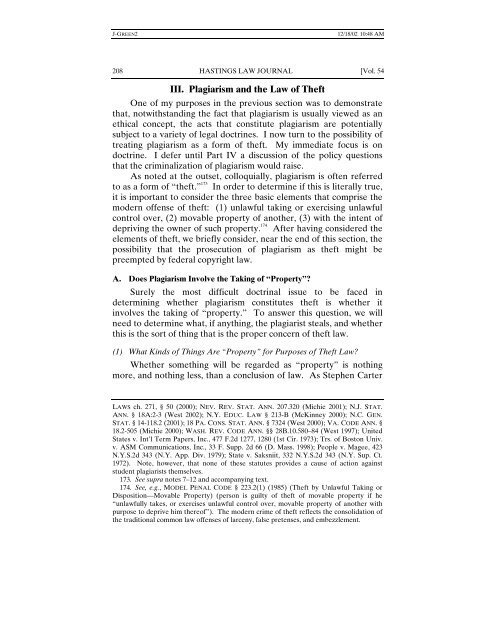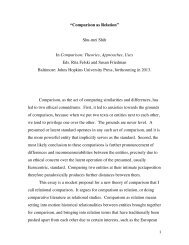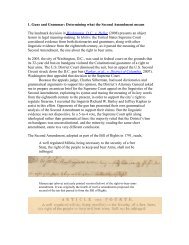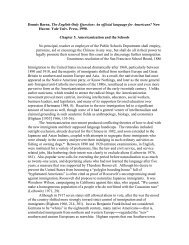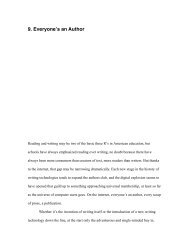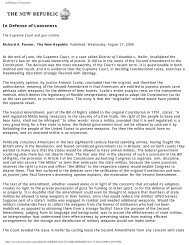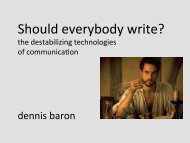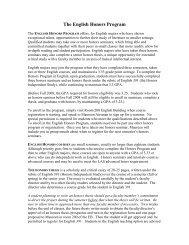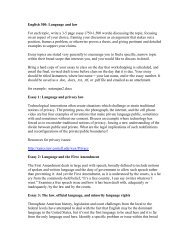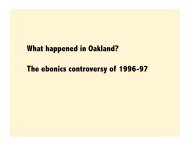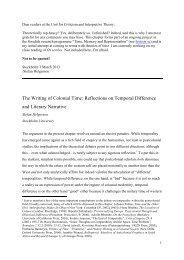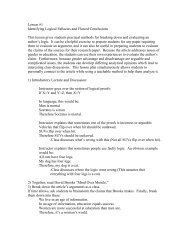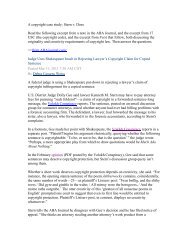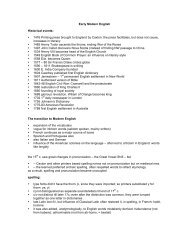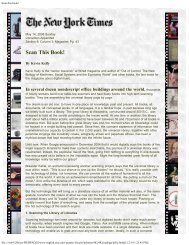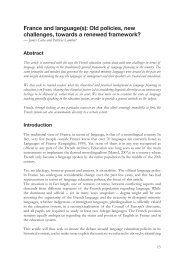Plagiarism, Norms, and the Limits of Theft Law: Some ... - English
Plagiarism, Norms, and the Limits of Theft Law: Some ... - English
Plagiarism, Norms, and the Limits of Theft Law: Some ... - English
You also want an ePaper? Increase the reach of your titles
YUMPU automatically turns print PDFs into web optimized ePapers that Google loves.
J-GREEN2 12/18/02 10:48 AM<br />
208 HASTINGS LAW JOURNAL [Vol. 54<br />
III. <strong>Plagiarism</strong> <strong>and</strong> <strong>the</strong> <strong>Law</strong> <strong>of</strong> <strong>Theft</strong><br />
One <strong>of</strong> my purposes in <strong>the</strong> previous section was to demonstrate<br />
that, notwithst<strong>and</strong>ing <strong>the</strong> fact that plagiarism is usually viewed as an<br />
ethical concept, <strong>the</strong> acts that constitute plagiarism are potentially<br />
subject to a variety <strong>of</strong> legal doctrines. I now turn to <strong>the</strong> possibility <strong>of</strong><br />
treating plagiarism as a form <strong>of</strong> <strong>the</strong>ft. My immediate focus is on<br />
doctrine. I defer until Part IV a discussion <strong>of</strong> <strong>the</strong> policy questions<br />
that <strong>the</strong> criminalization <strong>of</strong> plagiarism would raise.<br />
As noted at <strong>the</strong> outset, colloquially, plagiarism is <strong>of</strong>ten referred<br />
to as a form <strong>of</strong> “<strong>the</strong>ft.” 173 In order to determine if this is literally true,<br />
it is important to consider <strong>the</strong> three basic elements that comprise <strong>the</strong><br />
modern <strong>of</strong>fense <strong>of</strong> <strong>the</strong>ft: (1) unlawful taking or exercising unlawful<br />
control over, (2) movable property <strong>of</strong> ano<strong>the</strong>r, (3) with <strong>the</strong> intent <strong>of</strong><br />
depriving <strong>the</strong> owner <strong>of</strong> such property. 174 After having considered <strong>the</strong><br />
elements <strong>of</strong> <strong>the</strong>ft, we briefly consider, near <strong>the</strong> end <strong>of</strong> this section, <strong>the</strong><br />
possibility that <strong>the</strong> prosecution <strong>of</strong> plagiarism as <strong>the</strong>ft might be<br />
preempted by federal copyright law.<br />
A. Does <strong>Plagiarism</strong> Involve <strong>the</strong> Taking <strong>of</strong> “Property”?<br />
Surely <strong>the</strong> most difficult doctrinal issue to be faced in<br />
determining whe<strong>the</strong>r plagiarism constitutes <strong>the</strong>ft is whe<strong>the</strong>r it<br />
involves <strong>the</strong> taking <strong>of</strong> “property.” To answer this question, we will<br />
need to determine what, if anything, <strong>the</strong> plagiarist steals, <strong>and</strong> whe<strong>the</strong>r<br />
this is <strong>the</strong> sort <strong>of</strong> thing that is <strong>the</strong> proper concern <strong>of</strong> <strong>the</strong>ft law.<br />
(1) What Kinds <strong>of</strong> Things Are “Property” for Purposes <strong>of</strong> <strong>Theft</strong> <strong>Law</strong>?<br />
Whe<strong>the</strong>r something will be regarded as “property” is nothing<br />
more, <strong>and</strong> nothing less, than a conclusion <strong>of</strong> law. As Stephen Carter<br />
LAWS ch. 271, § 50 (2000); NEV. REV. STAT. ANN. 207.320 (Michie 2001); N.J. STAT.<br />
ANN. § 18A:2-3 (West 2002); N.Y. EDUC. LAW § 213-B (McKinney 2000); N.C. GEN.<br />
STAT. § 14-118.2 (2001); 18 PA. CONS. STAT. ANN. § 7324 (West 2000); VA. CODE ANN. §<br />
18.2-505 (Michie 2000); WASH. REV. CODE ANN. §§ 28B.10.580–84 (West 1997); United<br />
States v. Int’l Term Papers, Inc., 477 F.2d 1277, 1280 (1st Cir. 1973); Trs. <strong>of</strong> Boston Univ.<br />
v. ASM Communications, Inc., 33 F. Supp. 2d 66 (D. Mass. 1998); People v. Magee, 423<br />
N.Y.S.2d 343 (N.Y. App. Div. 1979); State v. Saksniit, 332 N.Y.S.2d 343 (N.Y. Sup. Ct.<br />
1972). Note, however, that none <strong>of</strong> <strong>the</strong>se statutes provides a cause <strong>of</strong> action against<br />
student plagiarists <strong>the</strong>mselves.<br />
173. See supra notes 7–12 <strong>and</strong> accompanying text.<br />
174. See, e.g., MODEL PENAL CODE § 223.2(1) (1985) (<strong>Theft</strong> by Unlawful Taking or<br />
Disposition—Movable Property) (person is guilty <strong>of</strong> <strong>the</strong>ft <strong>of</strong> movable property if he<br />
“unlawfully takes, or exercises unlawful control over, movable property <strong>of</strong> ano<strong>the</strong>r with<br />
purpose to deprive him <strong>the</strong>re<strong>of</strong>”). The modern crime <strong>of</strong> <strong>the</strong>ft reflects <strong>the</strong> consolidation <strong>of</strong><br />
<strong>the</strong> traditional common law <strong>of</strong>fenses <strong>of</strong> larceny, false pretenses, <strong>and</strong> embezzlement.


